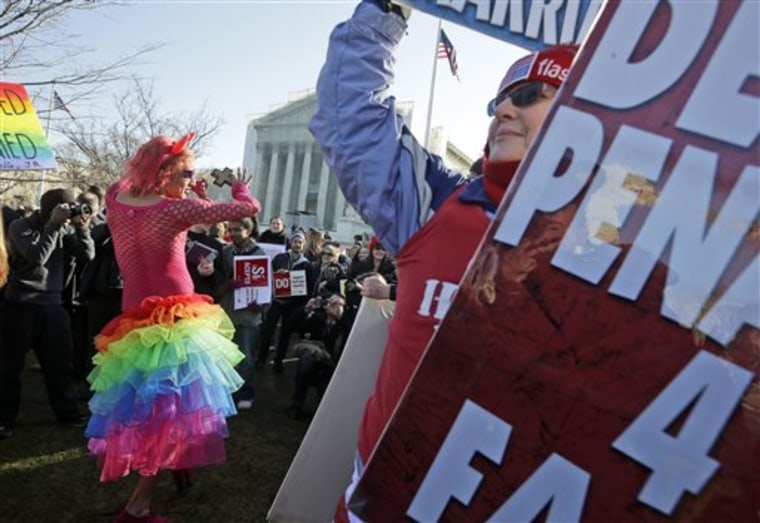American public opinion is in transition on the issue of the freedom to marry, and nowhere is that transition more apparent than within the Republican Party. In 1996, I was a high school student in socially conservative Southern Illinois knocking on doors for local Republican candidates. Listening to Christian radio, I can remember President Bill Clinton competing for the support of conservative voters by promoting the Defense of Marriage Act (DOMA). While my political stripes haven’t changed in the intervening seventeen years, my understanding of the values of individual freedom, personal responsibility, and limited government at the heart of the GOP has deepened, as it has for millions of thoughtful Americans who have had the courage to change their mind on civil marriage and embrace their neighbors’ freedom as their own.
The meaning of citizenship as it applies to gay and lesbian Americans is dawning on all of us, as support for the freedom to marry has skyrocketed from 27% in 1996 to 58% today. More than fifteen million Republicans currently support the freedom to marry, while another twelve million are on their way there—backing civil unions. Together these pro-freedom Republicans comprise nearly 60% of the party. According to a recent ABC News/Washington Post poll, 52% of Republicans under the age of 50 now support the legal right for same-sex couples to marry the person that they love. Support for the freedom to marry has increased dramatically among every demographic. And the most concerning statistic for the GOP is this—81% of 18-29 year-olds support marriage for all.
But a lot more has changed than the polling. The same Democratic president who signed DOMA and the discriminatory Don’t Ask, Don’t Tell policy has publicly repudiated both. More than 100 prominent Republicans have signed onto a legal brief arguing that gay citizens have a constitutional right to marry, while 208 Republican state legislators have stood up for the freedom to marry in statehouses around the country. Convinced that freedom truly means freedom for everyone, influential Republican donors have changed the political equation—investing heavily in the marriage movement’s successes in New York, New Hampshire and other states and starting their own Super PAC.
While pro-freedom Republicans were relegated to the sidelines for many years, today GOP leaders are beginning to openly embrace diversity of opinion on the issue within the party. After Senator Rob Portman of Ohio announced his support for same sex marriage, his colleagues came to his side. RNC Chairman Reince Priebus pledged to support him, noting, “I think that there isn’t anyone in this room, Republican, Democrat, in the middle, that doesn’t think that Rob Portman, for example, is a good conservative Republican. He is. And we know that.” The belief that marriage is strengthened, not undermined by providing equal access to civil marriage is no longer considered an affront to conservatism, but an affirmation of it—and it is being accepted as a valid point of view within the GOP.
This week, the United States Supreme Court hears oral arguments regarding California’s Proposition 8 and DOMA. As our national dialogue focuses on whether the freedom for each of us to marry the person we love is truly fundamental or whether the federal government may deny legally married same-sex couples equal treatment under the law, Republicans have a tremendous opportunity to reposition our party on these generational issues.
If the Court strikes down DOMA, the Republican Party has a tremendous opportunity to move forward, retire the politics of subtraction and focus on a winning message of individual freedom and economic growth. With equal treatment under the law, gay and lesbian citizens will be further integrated into the fabric of American life and come to even more closely resemble the politics of their families and communities. No longer appearing on the wrong side of history, well-educated swing voters will be more open to an authentically inclusive message from the GOP.
If the Court misses the opportunity to affirm that the Constitution applies equally to all Americans, the GOP must do what is right and necessary for it to survive—demonstrate that it is open and inclusive of all, regardless of one’s orientation. Our party has a wide diversity of opinion on this issue, and we must welcome people with sincerely held beliefs on both sides. This means that marriage cannot be a litmus test and Republican legislators must be free to vote their conscience on this important issue.
And it means that we must stand up for those legislators who do the right thing. Our party cannot be perceived as fighting the future or standing against a generational shift grounded in the core American values of individual freedom and equality under the law. Now is the time for the Republican Party to return to its roots and transition to inclusion once and for all.
